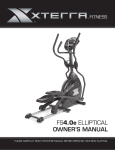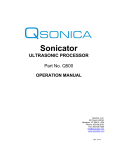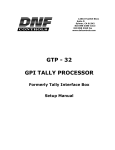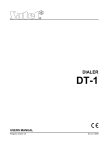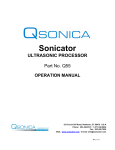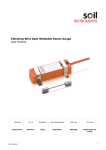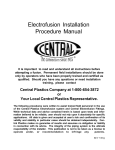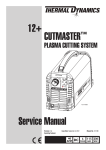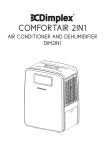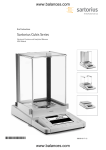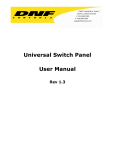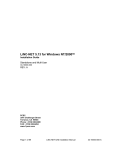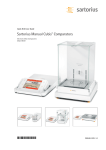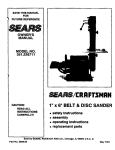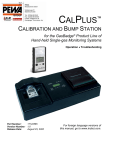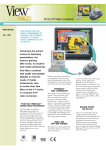Download Hand Held Welders - Sonics & Materials, Inc.
Transcript
Hand Held Welders Model H520 T/E Model H530 T/E Model H540 T/E I N S T R U C T I O N M A N U A L TABLE OF CONTENTS IMPORTANT SERVICE INFORMATION . . . . . . . . . . . . . . . . . . . . . . . . . . .3 Important Safeguards . . . . . . . . . . . . . . . . . . . . . . . . . . . . . . . . . . .3 Warnings . . . . . . . . . . . . . . . . . . . . . . . . . . . . . . . . . . . . . . . . . . . . .3 Symbols . . . . . . . . . . . . . . . . . . . . . . . . . . . . . . . . . . . . . . . . . . . . .4 SPECIFICATIONS . . . . . . . . . . . . . . . . . . . . . . . . . . . . . . . . . . . . . . . . . . . .5 IMPORTANT SERVICE LITERATURE . . . . . . . . . . . . . . . . . . . . . . . . . . . .6 Manual Change Information . . . . . . . . . . . . . . . . . . . . . . . . . . . . . .6 UNPACKING AND INSPECTION . . . . . . . . . . . . . . . . . . . . . . . . . . . . . . . .7 Visible Loss or Damage . . . . . . . . . . . . . . . . . . . . . . . . . . . . . . . . .7 Concealed Loss or Damage . . . . . . . . . . . . . . . . . . . . . . . . . . . . . .7 INTRODUCTION . . . . . . . . . . . . . . . . . . . . . . . . . . . . . . . . . . . . . . . . . . . . .8 OVERVIEW OF ULTRASONIC PLASTICS ASSEMBLY . . . . . . . . . . . . . . .8 What is Ultrasonics? . . . . . . . . . . . . . . . . . . . . . . . . . . . . . . . . . . . .8 Principal of Ultrasonic Assembly . . . . . . . . . . . . . . . . . . . . . . . . . .8 Ultrasonic Hand Held Welders . . . . . . . . . . . . . . . . . . . . . . . . . . . .8 GLOSSARY OF ULTRASONIC TERMS . . . . . . . . . . . . . . . . . . . . . . . . . .10 INSTALLATION AND SET UP . . . . . . . . . . . . . . . . . . . . . . . . . . . . . . . . . .11 Electrical Power Requirements . . . . . . . . . . . . . . . . . . . . . . . . . . .11 Setting Up . . . . . . . . . . . . . . . . . . . . . . . . . . . . . . . . . . . . . . . . . . .11 Electrical Connections . . . . . . . . . . . . . . . . . . . . . . . . . . . . . . . . .11 Cable Connections . . . . . . . . . . . . . . . . . . . . . . . . . . . . . . . . . . . .12 Key Components . . . . . . . . . . . . . . . . . . . . . . . . . . . . . . . . . . . . .13 Tip Assembly (CV53/55) . . . . . . . . . . . . . . . . . . . . . . . . . . . . . . . .14 Tip Replacement (CV53/55) . . . . . . . . . . . . . . . . . . . . . . . . . . . . .14 Horn Assembly (CVG54 Only) . . . . . . . . . . . . . . . . . . . . . . . . . . . .14 Tip Replacement (CVG54) . . . . . . . . . . . . . . . . . . . . . . . . . . . . . . .15 Tip Specifications . . . . . . . . . . . . . . . . . . . . . . . . . . . . . . . . . . . . .16 Options . . . . . . . . . . . . . . . . . . . . . . . . . . . . . . . . . . . . . . . . . . . . .17 Sonics & Materials, Inc. Corporate Headquarters 53 Church Hill Road • Newtown, CT 06470 USA 203.270.4600 • 800.745.1105 • 203.270.4610 fax www.sonics.com • [email protected] Information contained in this manual is subject to change without notice. Sonics & Materials, Inc. is not responsible for any typographic errors. © Sonics & Materials, Inc. 2012 Printed in U.S.A. Part No. 381-0035 Rev AC 03 8/12 • • • • • • • • • • • • • • • • • • • • • • • • • • • • • • • • • • • • • • • • • • • • • • • • • • • • • • • • • • • • • • • • • • • • • • • • • • • • • • • • • • • • • • • • • • • • • • • • • • • • • • • • • • • • INSTRUCTION MANUAL • HAND HELD WELDERS Go To Top Of Document 1 OPERATING PROCEDURES . . . . . . . . . . . . . . . . . . . . . . . . . . . . . . . . . .19 Front Panel Controls and Indicators . . . . . . . . . . . . . . . . . . . . . . .19 Keying in Parameters . . . . . . . . . . . . . . . . . . . . . . . . . . . . . . . . . .20 Operational Features . . . . . . . . . . . . . . . . . . . . . . . . . . . . . . . . . . .21 Starting up the Welder . . . . . . . . . . . . . . . . . . . . . . . . . . . . . . . . .21 Test Feature . . . . . . . . . . . . . . . . . . . . . . . . . . . . . . . . . . . . . . . . . .21 Ready Screens . . . . . . . . . . . . . . . . . . . . . . . . . . . . . . . . . . . . . . .22 Relationship of Time and Energy Settings . . . . . . . . . . . . . . . . . .23 Time Settings . . . . . . . . . . . . . . . . . . . . . . . . . . . . . . . . . . . . . . . .24 Energy Settings . . . . . . . . . . . . . . . . . . . . . . . . . . . . . . . . . . . . . . .25 Amplitude . . . . . . . . . . . . . . . . . . . . . . . . . . . . . . . . . . . . . . . . . . .25 Frequency Display . . . . . . . . . . . . . . . . . . . . . . . . . . . . . . . . . . . . .25 Overload Protection . . . . . . . . . . . . . . . . . . . . . . . . . . . . . . . . . . .26 Keypad Security . . . . . . . . . . . . . . . . . . . . . . . . . . . . . . . . . . . . . .27 APPLICATIONS – STAKING . . . . . . . . . . . . . . . . . . . . . . . . . . . . . . . . . . .28 Standard Flared Stake . . . . . . . . . . . . . . . . . . . . . . . . . . . . . . . . .28 Spherical Stake . . . . . . . . . . . . . . . . . . . . . . . . . . . . . . . . . . . . . .29 Hollow Stake . . . . . . . . . . . . . . . . . . . . . . . . . . . . . . . . . . . . . . . . .29 Knurled Stake . . . . . . . . . . . . . . . . . . . . . . . . . . . . . . . . . . . . . . . .29 Flush Stake . . . . . . . . . . . . . . . . . . . . . . . . . . . . . . . . . . . . . . . . . .30 APPLICATIONS – SPOT WELDING . . . . . . . . . . . . . . . . . . . . . . . . . . . . .31 Ordering Information . . . . . . . . . . . . . . . . . . . . . . . . . . . . . . . . . . .31 APPLICATIONS – ULTRASONIC INSERTION . . . . . . . . . . . . . . . . . . . . .32 MAINTENANCE . . . . . . . . . . . . . . . . . . . . . . . . . . . . . . . . . . . . . . . . . . . . .34 Cleaning Instructions . . . . . . . . . . . . . . . . . . . . . . . . . . . . . . . . . .34 Repairs / Service . . . . . . . . . . . . . . . . . . . . . . . . . . . . . . . . . . . . . .34 WARRANTY . . . . . . . . . . . . . . . . . . . . . . . . . . . . . . . . . . . . . . . . . . . . . . . .35 Limitation of Warranty . . . . . . . . . . . . . . . . . . . . . . . . . . . . . . . . . .36 APPENDIX . . . . . . . . . . . . . . . . . . . . . . . . . . . . . . . . . . . . . . . . . . . . . . . . .38 • • • • • • • • • • • • • • • • • • • • • • • • • • • • • • • • • • • • • • • • • • • • • • • • • • • • • • • • • • • • • • • • • • • • • • • • • • • • • • • • • • • • • • • • • • • • • • • • • • • • • • • • • • • • 2 INSTRUCTION MANUAL • HAND HELD WELDERS Go To Top Of Document IMPORTANT SAFETY INFORMATION IMPORTANT SAFEGUARDS – READ BEFORE INSTALLING OR USING THE EQUIPMENT Your Ultrasonic Equipment has been designed with safety in mind. However, no design can completely protect against improper usage, which may result in bodily injury and/or property damage. For your protection and equipment safeguard, observe the following warnings at all times, read the operating instructions carefully before operating the equipment, and retain this instruction manual for future reference. If the Ultrasonic Equipment is used in a manner contrary to that specified in this instruction manual, the protection features designed into the unit may be impaired. WARNINGS • Make sure the Ultrasonic Power Supply is properly grounded via a 3prong outlet. • High voltage is present in the power supply. Do not remove the cover. Refer all servicing to qualified service personnel. • Never operate the power supply unless it is connected to the hand gun. • Never secure anything to the front driver, the tip or the horn. • Never touch a vibrating horn. • If air-cooling the converter, always use dry compressed air. • Hearing protection is highly recommended. It is recommended that a sound abating enclosure or ear protection be used when operating the Ultrasonic Processor. • Do not modify horn configurations. • Do not affix any device to any portion of the horn. • Certain plastic materials, when ultrasonically welded, may emit fumes and/or gases hazardous to an operator’s health. Where such materials are processed, proper ventilation of the work station should be provided. If in doubt about the toxicity of your plastic material, contact OSHA, U.S. Department of Labor, or material supplier. • Maintenance should be performed only by a qualified electronic technician. • Always turn off the power supply before installing or removing the optional foot switch cable. • When the hand gun (converter) is on, be sure to isolate it from any/all grounded surfaces (including machine frames) to avoid triggering an overload condition as the system detects an alternate ground path. • • • • • • • • • • • • • • • • • • • • • • • • • • • • • • • • • • • • • • • • • • • • • • • • • • • • • • • • • • • • • • • • • • • • • • • • • • • • • • • • • • • • • • • • • • • • • • • • • • • • • • • • • • • • E Go To Top Of Document INSTRUCTION MANUAL • HAND HELD WELDERS 3 SYMBOLS Caution, risk of electric shock, hazardous voltage Caution, risk of danger. Refer to User Manual. WARNING or CAUTION Where you see the alert symbols and/or WARNING or CAUTION heading, strictly follow the warning instructions to avoid personal injury or equipment failure. • • • • • • • • • • • • • • • • • • • • • • • • • • • • • • • • • • • • • • • • • • • • • • • • • • • • • • • • • • • • • • • • • • • • • • • • • • • • • • • • • • • • • • • • • • • • • • • • • • • • • • • • • • • • 4 INSTRUCTION MANUAL • HAND HELD WELDERS Go To Top Of Document SPECIFICATIONS Power Supply Operational Input Voltage 115/230 V~ +/-10% @ 50/60 Hz Rated Voltage/Current 115/230 V~, 5 A max. Fuse Rating F6.3A 250V* Weight 13 lbs. (5.9 Kg) Dimensions 8.5"H x 13.5"W x 7.5"D 216 mm x 340 mm x 190 mm Output Voltage 1000 V rms (max.) Output Frequency 20 KHz (nom.), 30 kHz or 40 KHz Converter CV 55 & CV 53 CV 54 Weight 1.5 lbs. (0.68 Kg) 1.5 lbs. (0.68 Kg) Dimensions 7.1" (CV55) or 6.3” L (CV53) x 1.9" Dia. (180 or 160 mm x 48.3 mm) (with standard tip) 6.3" L x 1.9" Dia. (160 mm x 48.3 mm) Titanium Titanium or aluminum Horn Materials Tip CV 55 & CV 53 Dimensions Standard 1/2" diameter (12.7 mm) Materials Titanium Alloy Ti-6Al-4V (without horn) CV 54 n/a Environmental Pollution Degree 2 Installation Category II Operating Limits Temperature: 41 - 104ºF (5 - 40ºC) Relative Humidity 20 - 90% (Non Condensing) Altitude: 6,651 ft. (2000 m) Shipping/Storage Temperature: 35 -120ºF (2 - 49ºC) Relative Humidity 10 - 95% (Non Condensing) Ambient Pressure Extremes: 40,000 ft. (12,192 m) Restriction of Hazardous Substances (ROHS) RoHS Compliant Directive 2002/95/EC Relative humidity Maximum relative humidity 80% for temperatures up to 31ºC decreasing linearly to 50% relative humidity to 40ºC Other For indoor use only *Only use IEC approved Fast acting fuses, Cooper Bussman series S500. • • • • • • • • • • • • • • • • • • • • • • • • • • • • • • • • • • • • • • • • • • • • • • • • • • • • • • • • • • • • • • • • • • • • • • • • • • • • • • • • • • • • • • • • • • • • • • • • • • • • • • • • • • • • Go To Top Of Document INSTRUCTION MANUAL • HAND HELD WELDERS 5 IMPORTANT SERVICE LITERATURE Please read carefully before operating the equipment, then forward to your service department. The system supplied with this instruction manual is constructed of the finest material and the workmanship meets the highest manufacturing standards. It has been thoroughly tested and inspected before leaving the factory and when used in accordance with the procedures outlined in this manual, will provide you with many years of safe and dependable service. MANUAL CHANGE INFORMATION We continually strive to be at the forefront of the latest electronic developments by adding circuit and component improvements to our equipment as soon as they are developed and tested. Sometimes, due to printing and shipping requirements, we cannot incorporate these changes immediately into printed manuals. Hence, your manual may contain new change information. Change information, if any, is located in the Appendix. We reserve the right to make any changes in the design or construction of our equipment at any time, without incurring any obligation to make any change whatsoever in units previously delivered. The technical data and schematics in the manual are for informational purposes only and may not reflect the current configuration being shipped from our factory. Upon formal request, complete and up-to-date information can be provided from the factory free of charge. • • • • • • • • • • • • • • • • • • • • • • • • • • • • • • • • • • • • • • • • • • • • • • • • • • • • • • • • • • • • • • • • • • • • • • • • • • • • • • • • • • • • • • • • • • • • • • • • • • • • • • • • • • • • 6 INSTRUCTION MANUAL • HAND HELD WELDERS Go To Top Of Document UNPACKING AND INSPECTION NOTE: We recommend keeping all carton(s) and packing material in case it might be necessary to move the equipment, or to ship it for repair. Before unpacking the equipment, check the shipping carton for any visible damage. If you see any, be sure to follow the procedures described below under “Visible Loss or Damage.” Otherwise, proceed to remove the equipment from the carton. Before disposing of any packing material, check it carefully for small parts. Then perform a visual inspection of the equipment to detect any evidence of damage which might have occurred during shipment. Check the following: 1. all components against the enclosed packing list, 2. all module plug-in units, 3. all wire plug-in connections. The equipment was carefully packed and thoroughly inspected before leaving our factory. All units are tested and checked for problems prior to shipping. It is asked that when a problem does occur that all parts and components be inspected for damage (especially when the unit is not in working order when received). Responsibility for safe delivery was assumed by the carrier upon acceptance of the shipment. Claims for loss of damage sustained in transit must therefore be made upon the carrier, as follows: VISIBLE LOSS OR DAMAGE Any external evidence of loss or damage must be noted on the freight bill or express receipt, and signed by the carrier’s agent. Failure to adequately describe such external evidence of loss or damage may result in the carrier’s refusal to honor a damage claim. The form required to file such a claim will be supplied by the carrier. CONCEALED LOSS OR DAMAGE Concealed loss or damage means loss or damage which does not become apparent until the merchandise has been unpacked. The contents might have been damaged in transit due to rough handling even though the container may not show external damage. When the damage is discovered upon unpacking, make a written request for inspection by the carrier’s agent within 48 hours of the delivery date. Then file a claim with the carrier since such damage is the carrier’s responsibility. The form required to file such a claim will be supplied by the carrier. Do not destroy packing materials, or move material from one location to another before the carrier makes their inspection. If the system or any unit is damaged, notify “Sonics.” “Sonics” will arrange for repair or replacement of damaged equipment without waiting for the claim against the carrier to be settled, provided a new purchase order is issued to cover the repair or replacement costs. Should any damage, shortage or discrepancy exist, please notify us immediately. • • • • • • • • • • • • • • • • • • • • • • • • • • • • • • • • • • • • • • • • • • • • • • • • • • • • • • • • • • • • • • • • • • • • • • • • • • • • • • • • • • • • • • • • • • • • • • • • • • • • • • • • • • • Go To Top Of Document INSTRUCTION MANUAL • HAND HELD WELDERS 7 INTRODUCTION Sonics’ hand held welders are portable 500 watt welders used for plastics assembly that consist of an ultrasonic power supply and a hand gun. These units are designed specifically for welding, staking, inserting and spot welding applications (refer to the Applications section of this manual beginning on page 26 for more information on these operations). The model H520 is a 20 kHz power supply that comes with the CV55 hand gun; the H530 is a 30 kHz power supply that comes with the CV53 hand gun. The CV53/55 units are supplied with an integral 1/2" (12.7mm) diameter titanium front driver with a replaceable flat face tip. (Other standard or custom tips are available.) The model H540 is a 40 kHz power supply that comes with the CVG54 hand gun. The CVG54 hand gun is supplied with a removable horn designed specifically for each customer’s requirements. The higher frequency and lower amplitude of the 40 kHz system makes it ideal for welding small assemblies that require gentler action. The power supplies of all models feature autotune circuitry. OVERVIEW OF ULTRASONIC PLASTICS ASSEMBLY WHAT IS ULTRASONICS? Ultrasonics refers to vibrational waves with a frequency above the human audible range which is usually above 18,000 cycles per second (Hz). PRINCIPLE OF ULTRASONIC ASSEMBLY The basic principle of ultrasonic assembly involves conversion of high frequency electrical energy to high frequency mechanical energy in the form of reciprocating vertical motion which, when applied to a thermoplastic, generates frictional heat at the plastic/plastic or plastic/metal interface. In ultrasonic welding, this frictional heat melts the plastic, allowing the two surfaces to fuse together; in ultrasonic staking or insertion, the controlled flow of molten plastic is used to capture or lock another material in place (staking) or encapsulate a metal insert (insertion). ULTRASONIC HAND HELD WELDERS “Sonics” ultrasonic hand held welders are generally composed of the following major elements: a power supply, hand gun (converter), and horn (H540E only) as detailed in the diagram on the next page. A review of this diagram will help you understand the basic elements involved in the assembly process and their relation to each other. • • • • • • • • • • • • • • • • • • • • • • • • • • • • • • • • • • • • • • • • • • • • • • • • • • • • • • • • • • • • • • • • • • • • • • • • • • • • • • • • • • • • • • • • • • • • • • • • • • • • • • • • • • • • 8 INSTRUCTION MANUAL • HAND HELD WELDERS Go To Top Of Document “SONICS” ULTRASONIC ASSEMBLY SYSTEMS 50/60 Hz Electrical power Power Supply/Generator Generates ultrasonic electrical energy (20/30/40 kHz) Ultrasonic electrical energy Hand Gun Converter Transforms ultrasonic electrical energy to ultrasonic mechanical vibrations Ultrasonic Vibrations Horn/Replaceable Tip Contacts and transfers vibrational energy to plastic part Ultrasonic Vibrations • • • • • • • • • • • • • • • • • • • • • • • • • • • • • • • • • • • • • • • • • • • • • • • • • • • • • • • • • • • • • • • • • • • • • • • • • • • • • • • • • • • • • • • • • • • • • • • • • • • • • • • • • • • • Go To Top Of Document INSTRUCTION MANUAL • HAND HELD WELDERS 9 GLOSSARY OF ULTRASONIC TERMS POWER SUPPLY/GENERATOR – The solid state power supply converts standard 50/60 Hz electrical power to 20,000, 30,000 or 40,000 Hz (20/30/40 kHz) electrical energy. CONVERTER – The converter changes the high frequency electrical energy supplied by the power supply to high frequency mechanical vibrations. TIP/HORN – The tip/horn is a tuned component of the system which comes in contact with the parts to be assembled. The tip/horn 1) transfers the ultrasonic vibrations produced from the converter to the parts being welded, and 2) applies necessary force to the assembly while the material resolidifies. AMPLITUDE – The peak to peak excursion of a horn at its output face. • • • • • • • • • • • • • • • • • • • • • • • • • • • • • • • • • • • • • • • • • • • • • • • • • • • • • • • • • • • • • • • • • • • • • • • • • • • • • • • • • • • • • • • • • • • • • • • • • • • • • • • • • • • • 10 INSTRUCTION MANUAL • HAND HELD WELDERS Go To Top Of Document INSTALLATION AND SET UP ELECTRICAL POWER REQUIREMENTS The line cord of the controller/power supply is equipped with a 3prong, grounding plug. Do not, under any circumstances, remove the ground prong. The plug must be plugged into a mating 3-prong, grounding type outlet. The power supply requires a fused, single-phase, standard 3-terminal grounding type receptacle capable of supplying the requisite voltage and current. (Standard 120 volts or optional 220 volts, 50/60 Hz, regulated between 95-135 volts or 190-265 volts, respectively.) SETTING UP The power supply is a free-standing assembly. It should be installed in a clear, uncluttered location that is free from excessive dirt, dust, corrosive fumes, and temperature and humidity extremes. The selected installation site should be near the electrical power source and away from equipment that generates abnormally high electrical transients. Observe the following additional instructions when installing the equipment: a. Allow at least 6 inches (152.4mm) at the rear of the power supply for cable connections. b. Position the power supply so that the front panel controls are visible and readily accessible. If power supply is to be run continuously, air cooling of the converter and horn is required. Use clean, dry compressed air filtered down to 5 microns. c. The power supply is air cooled; allow sufficient space around the assembly to ensure adequate ventilation. If the power supply must be housed in a confined space, forced air cooling may be necessary to keep surrounding air within acceptable ambient temperature limits. Periodically check the ventilation grille and clean as necessary. ELECTRICAL CONNECTIONS When making the initial electrical connections, make sure the power is disconnected and follow these precautions. 1. Do not strain or kink the cables. When going around corners, allow as wide a bend as possible. Do not run the cables parallel to any power line within a distance of less than 1 foot (305mm). Do not plug the power supply into an electrical outlet until all other connections have been made. 2. To prevent the possibility of an electrical shock, ensure that the power supply line cord is properly grounded. Also make sure that the voltage rating of the electrical power source matches the power supply requirement. 3. Check with your electrician if you have any wiring questions. • • • • • • • • • • • • • • • • • • • • • • • • • • • • • • • • • • • • • • • • • • • • • • • • • • • • • • • • • • • • • • • • • • • • • • • • • • • • • • • • • • • • • • • • • • • • • • • • • • • • • • • • • • • • INSTRUCTION MANUAL • Go To Top Of Document HAND HELD WELDERS 11 CABLE CONNECTIONS: Make sure the ON/OFF switch is in the OFF position and the power supply line cord is not plugged in before making any cable connections. Located at the rear of the power supply are the cable connections as illustrated below. (The interconnecting cables will be supplied with your system.) 1. A round, 4-pin cable (with red locator dot) that connects the hand gun to the power supply. 2. A standard DB9 I/O connector that can interface with automated machines via a PLC. (See drawing in the Appendix at the back of this manual.) 3. 3-prong inlet to connect the power supply with the appropriate electrical outlet. Do not make this connection until the hand gun is connected to the power supply. Once these connections have been made, the power supply is ready for operation. Always turn off the power supply before installing or removing the foot switch cable. ❷ ❹ ❶ ❺ ❸ Do not use a damaged or worn hand gun cable. Never use the cable and hand gun as a rope; it is not rated for pulling weight. Also located at the rear of the power supply are the following: 4. Foot switch jack – connects foot switch cable to enable remote actuation. 5. Fuses – 120V = 15A slo-blo 230V = 8A slo-blo • • • • • • • • • • • • • • • • • • • • • • • • • • • • • • • • • • • • • • • • • • • • • • • • • • • • • • • • • • • • • • • • • • • • • • • • • • • • • • • • • • • • • • • • • • • • • • • • • • • • • • • • • • • • 12 INSTRUCTION MANUAL • HAND HELD WELDERS Go To Top Of Document KEY COMPONENTS Pictured below is the power supply with hand gun options. POWER SUPPLY CV53 / CV55* *CV55 shown HAND GUN TIP TRIGGER SWITCH HAND GUN HORN CVG54 TIP • • • • • • • • • • • • • • • • • • • • • • • • • • • • • • • • • • • • • • • • • • • • • • • • • • • • • • • • • • • • • • • • • • • • • • • • • • • • • • • • • • • • • • • • • • • • • • • • • • • • • • • • • • • • Go To Top Of Document INSTRUCTION MANUAL • HAND HELD WELDERS 13 TIP ASSEMBLY (CV53 & CV55) If the tip is not already assembled, follow the instructions below as applicable (CV55 unit is shown below but instructions also apply to CV53). NOTE: Never remove or install a tip by holding the hand gun case or rotating the tip with only one wrench as this may cause damage to the booster and/or converter. NOTE: Before using wrenches to assemble as shown, you should be able to seat the horn or tip without encountering resistance in the mating threads. TIP REPLACEMENT (CV53 & CV55) 1. Clean the mating surfaces, as well as the threaded stud and hole. Check that the stud is tight (see recommended torque requirements on page 13). 2. Hand assemble the tip to the titanium driver using open-ended wrenches as shown below. Tighten securely. Do not force or overtighten. CV55 (shown) or CV53 / TIP HORN ASSEMBLY (CVG54 ONLY): 1. Clean the mating surfaces of the converter and horn, as well as the threaded stud and hole. Check that the stud is tight (see recommended torque requirements on page 13). 2. Hand assemble the converter and horn together using open-ended wrenches as shown below. Tighten securely. Do not force or overtighten. CVG54 / HORN • • • • • • • • • • • • • • • • • • • • • • • • • • • • • • • • • • • • • • • • • • • • • • • • • • • • • • • • • • • • • • • • • • • • • • • • • • • • • • • • • • • • • • • • • • • • • • • • • • • • • • • • • • • • 14 INSTRUCTION MANUAL • HAND HELD WELDERS Go To Top Of Document TIP REPLACEMENT (CVG54) 1. Clean the mating surfaces, as well as the threaded stud and hole. Check that the stud is tight. (See recommended torque requirements below.) 2. Hand assemble the tip to the horn using open-ended wrenches as shown below and tighten securely. Do not force or overtighten. CVG54 /HORN / TIP RECOMMENDED TORQUE REQUIREMENTS Frequency Component Thread Size 20 / 30 kHz Converter / Tip 1/4-28 25-35 34-47 40 kHz Converter / Horn 8 mm 25-35 34-47 40 kHz Horn / Tip 1/4-28 25-35 34-47 Foot-Lbs. Newton-Meters • • • • • • • • • • • • • • • • • • • • • • • • • • • • • • • • • • • • • • • • • • • • • • • • • • • • • • • • • • • • • • • • • • • • • • • • • • • • • • • • • • • • • • • • • • • • • • • • • • • • • • • • • • • • Go To Top Of Document INSTRUCTION MANUAL • HAND HELD WELDERS 15 TIP SPECIFICATIONS A variety of replaceable tips – both custom and standard – are available for the hand held welding systems. Upon request, special carbide faced, wear resistant, flat, knurled, and custom faced tips are available. INSERTING STAKING FLAT SPOT WELDING KNURLED Refer to the various tables under staking, spot welding and insertion descriptions on pages 26-31 for lists of standard threaded tips. For custom tips, call our Sales Department at 203-270-4600. • • • • • • • • • • • • • • • • • • • • • • • • • • • • • • • • • • • • • • • • • • • • • • • • • • • • • • • • • • • • • • • • • • • • • • • • • • • • • • • • • • • • • • • • • • • • • • • • • • • • • • • • • • • • 16 INSTRUCTION MANUAL • HAND HELD WELDERS Go To Top Of Document OPTIONS Always turn off the power supply before installing or removing the foot switch cable. The following options and accessories are available for the hand held welding systems. 1. FOOT SWITCH for remote activation. (When foot switch actuation is used, the trigger handle is removed from the hand gun housing.) 2. MANUAL ARBOR PRESS, available with foot switch or cam actuation, is designed for assembling parts where production volume does not justify automated equipment. The press provides a more controlled motion of the welder than is possible by just holding the hand gun, resulting in more consistent assemblies. MANUAL PRESS • • • • • • • • • • • • • • • • • • • • • • • • • • • • • • • • • • • • • • • • • • • • • • • • • • • • • • • • • • • • • • • • • • • • • • • • • • • • • • • • • • • • • • • • • • • • • • • • • • • • • • • • • • • • INSTRUCTION MANUAL • HAND HELD WELDERS Go To Top Of Document 17 3. STAPLER with special pivoting mechanism. Ideal for sealing low production rate clamshell packages (for 20 kHz Models only). STAPLER 4. PISTOL GRIP for more ergonomic handling of the hand gun in specialized applications. PISTOL GRIP • • • • • • • • • • • • • • • • • • • • • • • • • • • • • • • • • • • • • • • • • • • • • • • • • • • • • • • • • • • • • • • • • • • • • • • • • • • • • • • • • • • • • • • • • • • • • • • • • • • • • • • • • • • • 18 INSTRUCTION MANUAL • HAND HELD WELDERS Go To Top Of Document OPERATING PROCEDURES FRONT PANEL CONTROLS AND INDICATORS Located at the front of the power supply are the following controls: Do not operate the power supply unless it is connected to the hand gun. 2 3 4 3 5 6 10 7 4 NOTE: The operating range of amplitude is 20-100% 11 12 8 1 9 1. ON/OFF switch which turns the power supply on and off. The switch remains in a “latched state” even if power is interrupted or disconnected. For example, if the unit is switched on and is then disconnected from the power source, once it is reconnected to power, the unit will be on. Likewise, if the unit is off and then disconnected, it will remain off when reconnected to power until the ON switch is pressed. 2. LCD SCREEN which displays various settings, parameters and prompts as detailed in the following pages. In addition, during the weld process it displays a load meter indicator showing the power level of ultrasonics that is being delivered to the welder (see #3 below). If ultrasonics are run continuously (time setting = 0), be sure to air cool the converter. 3. LOAD METER SCALE from 0 to 100% which (in conjunction with vertical line indicators on LCD display) shows the running power (bar graph at bottom of display) and peak power (single vertical line at top of display) during the weld. Peak power is reported as %Pmax after the cycle (see page 21). 4. TIME key which allows selection and display of time settings and permits adjustment of time duration in .01 second increments (from 00.00 to 99.99 seconds) for three time parameters as follows: a. Weld time b. Time Limit Low c. time Limit High • • • • • • • • • • • • • • • • • • • • • • • • • • • • • • • • • • • • • • • • • • • • • • • • • • • • • • • • • • • • • • • • • • • • • • • • • • • • • • • • • • • • • • • • • • • • • • • • • • • • • • • • • • • • INSTRUCTION MANUAL • HAND HELD WELDERS Go To Top Of Document 19 For a complete explanation of these parameters, refer to page 22. 5. ENERGY key (active on E models only) which allows selection and display of the following energy settings and permits adjustment of the energy parameters a. through c. below in 1 joule increments (from 0 to 999,999 joules): a. Energy Setting b. Energy Limit Low c. Energy Limit High For a complete explanation of these parameters, refer to page 23. 6. AMPLITUDE key which controls adjustment of the amplitude setting, relating to the system’s high-frequency vibrations over the full operating range. Refer to page 23 for more information. 7. FN KEY. Option not available on this model. 8. TEST key which can be used to test the actual power output (watts). When this key is pressed, the ultrasonics are activated and will remain on (cycle) for 5 seconds. The number of watts will be displayed on the LCD screen and a line will display along the bar graph on the bottom of the LCD screen which will reflect the percentage of power output. 9. O.L. RESET key which resets the power supply following an overload condition. Red LED in upper left corner indicates an overload condition exists. Refer to page 24 for complete information. 10. 0-9 NUMERIC KEYPAD which allows input of numeric data by pressing the keys. 11. CLEAR key which clears the preceding entry when pressed. 12. ENTER/REVIEW key which serves to enter data into the system and/or to display data (or parameters) on the LCD screen. KEYING IN PARAMETERS To make numeric entries into a cursor location that is displayed on a screen menu, use the numeric keypad. When the desired entry is displayed on the LCD screen, use the ENTER key to register the new value. Entries are made left to right. The CLEAR key will clear an existing value to 0, displayed as a series of dashes, and relocate the cursor to the extreme left-hand entry position ready to accept entries again. As soon as a desired value is keyed in and displayed, pressing the ENTER key makes the system accept that entry. If a number value is not “Entered,” then it will not be accepted by the system and the parameter value will return to its former setting (before any numerical values • • • • • • • • • • • • • • • • • • • • • • • • • • • • • • • • • • • • • • • • • • • • • • • • • • • • • • • • • • • • • • • • • • • • • • • • • • • • • • • • • • • • • • • • • • • • • • • • • • • • • • • • • • • • 20 INSTRUCTION MANUAL • HAND HELD WELDERS Go To Top Of Document OPERATIONAL FEATURES – Adjustable tolerance limits in energy (Ws) (for E models only) and time (sec) with visual alarms. – Information displays including: number of assemblies, number of rejects, and number of cycles. – Fault displays. – Keypad security. STARTING UP THE WELDER Press the ON/OFF button to turn the welder on. The LCD screen will display the model number, wattage and frequency information. Then the LCD screen will show the following “ready” display: 00.00 sec 000000 J 00 %Pmax This display shows the last weld information – weld time, energy (on E models only) and power. (After power down and subsequent power up, values are cleared to zero.) TEST FEATURE After the press is turned on, press and hold the TEST button. While depressing the TEST button, check the display. Make sure the bar graph indicator on the display (a series of vertical lines that register to the 0 to 100% load meter scale – see example below) does not exceed 20%. 0045 Watts The TEST and Load Meter check should always be done for all cold start-ups, and for any start-up after the system has been idle for 20 minutes or more. During the testing process, keep in mind that the ultrasonics are only activated as long as the TEST button is depressed – once you release the TEST button, ultrasonics is terminated. A bar graph indicator reading of above 20%, signals that there may be a problem with the stack. If this occurs check your assembly and re-test. • • • • • • • • • • • • • • • • • • • • • • • • • • • • • • • • • • • • • • • • • • • • • • • • • • • • • • • • • • • • • • • • • • • • • • • • • • • • • • • • • • • • • • • • • • • • • • • • • • • • • • • • • • • • INSTRUCTION MANUAL • HAND HELD WELDERS Go To Top Of Document 21 Frequency Display The TEST key can also be used to display the running ultrasonic frequency. Refer to page 23 for more information. READY SCREENS In addition to the start-up ready screen (shown on page 20), there are 2 other “ready” screens. The power supply must be displaying one of the 3 ready screens in order for welding to commence. Welding cannot be initiated from any other display. All 3 ready screens can be accessed by pressing the ENTER/REVIEW key. The other 2 ready screens are as follows: *Alarms* Time: – – Energy: – – Alarm Screen The Alarm screen displays information about the alarm(s) that have been triggered by the system encountering parameters outside of the specified tolerance limits. The screen will indicate whether alarms occurred in Time or Energy (on E models only). If there are no alarms, dashes will display. If there are alarms, an L (for Low limit, indicating that the low limit was violated) and/or an H (for High limit, indicating that the high limit was violated) will display by the applicable mode (time or energy). Once another new cycle is begun, the system will automatically clear the current alarm. Counter Screen Cycles: 00,004,678 CRC: 000,062 RAC: 0,000 The Counter screen displays information about the job number, the number of cycles run to date, the customer resettable counter (CRC) and the resettable alarm counter (RAC). The 2 resettable counters can be reset whenever desired by pressing the Clear key when the counter screen is displayed (the keypad must be unlocked). • • • • • • • • • • • • • • • • • • • • • • • • • • • • • • • • • • • • • • • • • • • • • • • • • • • • • • • • • • • • • • • • • • • • • • • • • • • • • • • • • • • • • • • • • • • • • • • • • • • • • • • • • • • • 22 INSTRUCTION MANUAL • HAND HELD WELDERS Go To Top Of Document RELATIONSHIP OF TIME AND ENERGY SETTINGS (ON E MODELS ONLY) Parameters can be set in the time and energy menus. The settings in both of these menus should be taken into account when you are setting up a job since they do not function independently of each other and a parameter in one menu can impact the effect of a parameter in another menu. For example, if you specify a weld time of 2 seconds and an energy setting of 2,000 joules, the weld cycle will be terminated by whichever of the 2 settings (Weld Time or Energy Setting) is reached first – that is, either when ultrasonics have been applied for 2 seconds or when energy equivalent to 2,000 joules has been delivered to the parts being assembled. If 2 seconds is reached before 2,000 joules have been delivered, the weld cycle will terminate regardless of the amount of energy delivered, and vice versa. The start-up ready screen which shows the last weld information will show a flashing “sec” or “J” to indicate which setting was achieved first and thereby terminated the weld cycle. In the example above, if the weld time of 2 seconds is reached before 2000 joules have been delivered, the ready screen will display “02.00 sec,” with the “sec” flashing, along with whatever energy was delivered. The peak power delivered (%Pmax) will be displayed as a percent of the supply rating. The ability to specify Time and Energy affords maximum control of the weld process. However, when entering your specifications in the various menus described below, keep in mind that the settings from previous use remain in effect until you make a change and use the Enter key to register a new value. This means that if you want to achieve a weld time of 2 seconds, for example, you will need to ensure that other entries in the Energy menu will allow a 2-second weld before an Energy setting is reached (and ultrasonics are terminated). • • • • • • • • • • • • • • • • • • • • • • • • • • • • • • • • • • • • • • • • • • • • • • • • • • • • • • • • • • • • • • • • • • • • • • • • • • • • • • • • • • • • • • • • • • • • • • • • • • • • • • • • • • • • INSTRUCTION MANUAL • HAND HELD WELDERS Go To Top Of Document 23 TIME SETTINGS There are 3 time parameters, or timers, that can be set. They are accessed by pressing the Time key which allows specification of the following time parameters. The first menu display will show the following: Weld Time – sets the duration of time for which ultrasonic vibrations are applied to the parts. If the time value is cleared (zero or dashes displayed on screen), then ultrasonics will be activated when the hand gun trigger switch is depressed. Press the Time key again (and successively after each menu display) to advance to these next screen displays: Time Limit Low – sets the low time alarm examination point (as a tolerance limit). A time alarm will be triggered if the actual weld time is less than this value. The time low alarm will show on the Alarm Screen display and will be indicated by a flashing LED on the Time key. By specifying values for this limit and the Time Limit High, a weld time “window” is created that defines a ”good weld.” (If no alarms are triggered – the weld cycle occurred within the designated time limits.) Time Limit High – sets the high time alarm examination point. A time alarm will be triggered if the actual weld time is greater than this value. The time high alarm will show on the Alarm Screen display and will be indicated by a flashing LED on the Time key. • • • • • • • • • • • • • • • • • • • • • • • • • • • • • • • • • • • • • • • • • • • • • • • • • • • • • • • • • • • • • • • • • • • • • • • • • • • • • • • • • • • • • • • • • • • • • • • • • • • • • • • • • • • • 24 INSTRUCTION MANUAL • HAND HELD WELDERS Go To Top Of Document ENERGY SETTINGS (ON E MODELS ONLY) There are 3 energy parameters that can be specified. These are accessed by pressing the Energy key, which allows specification of the following parameters. The first menu display will show the following: Energy Setting – sets the amount of energy in joules to be delivered to the parts being assembled. Press the Energy key again (and successively after each menu display) to advance to these next screen displays. Energy Limit Low – sets the low energy alarm examination point (as a process control tolerance limit). An energy alarm will be triggered if the actual weld energy is less than this value. The energy low alarm will show on the Alarm Screen display and will be indicated by a flashing LED on the Energy key. By specifying values for this limit and the Energy Limit High, a weld energy “window” can be created in which a ”good weld” can occur. (If no alarms are triggered – the weld cycle occurred within the designated energy limits.) Energy Limit High – sets the high energy alarm examination point (see Limit Low above). An energy alarm will be triggered if the actual weld energy is greater than this value. The energy high alarm will show on the Alarm Screen display and will be indicated by a flashing LED on the Energy key. AMPLITUDE The Amplitude Setting is used to make fine adjustments to vibrational amplitude, from 20% (minimum) to 100% (maximum). FREQUENCY DISPLAY The TEST key can also be used to display the running frequency. Press and hold the TEST key for 3 seconds. The information on the display will change to include a frequency counter display (Hz). After this switch, the power is captured (no longer updated) and the frequency display will update every second. This information can help diagnose problems with the hand gun. • • • • • • • • • • • • • • • • • • • • • • • • • • • • • • • • • • • • • • • • • • • • • • • • • • • • • • • • • • • • • • • • • • • • • • • • • • • • • • • • • • • • • • • • • • • • • • • • • • • • • • • • • • • • INSTRUCTION MANUAL • HAND HELD WELDERS Go To Top Of Document 25 OVERLOAD PROTECTION When the hand gun (converter) is on, be sure to isolate it from any/all grounded surfaces (including machine frames) to avoid triggering an overload condition as the system detects an alternate ground path. There are two overload protection circuits – one for the power supply and one for the hand gun – which will terminate the welding cycle when the system is operated under adverse conditions, such as excessive wattage, voltage or current, or a loose or failed horn/tip. The welding cycle will also be automatically terminated if the hand gun contacts a grounded surface while the power is on – the power supply will overload because it detects an alternate ground path. The overload protection circuits will prevent damage to internal system components. Depending upon the type of condition that caused the overload, the situation is resolved by different methods. If an ultrasonic overload condition exists, simply press the O.L. Reset key to reset the system. If a shock protection condition caused the overload, the system cannot be reset with the O.L. Reset key. The system must be powered down (using the ON/OFF switch) and the cable/hand gun connection problem(s) fixed, before turning the power supply back on. (There is a ground fault circuit for shock protection which monitors currents in the hand gun cable and the earth ground. If a wire breaks or an alternate ground path is detected - which changes the currents - the unit will go into a latched “Off” state to protect the operator.) If an overload condition persists, contact our Service Department at 1-800745-1105. • • • • • • • • • • • • • • • • • • • • • • • • • • • • • • • • • • • • • •• • • • • • • • • • • • • • • • • • • • • • • • • • • • • • • • • • • • • • • • • • • • • • • • • • • • • • • • • • • • • • • • • • • • • • • • 26 INSTRUCTION MANUAL • HAND HELD WELDERS Go To Top Of Document KEYPAD SECURITY The keypad can be “locked,” so that no new parameters or commands can be entered via the keyboard, thereby preventing unauthorized cancellation or adjustment. To activate the security feature, press and hold the numeral 7 key on power up. When the keypad is secured in this manner, any attempt to change or enter parameters will result in the following message being displayed on the LCD screen: KEYBOARD LOCKED! • • • • • • • • • • • • • • • • • • • • • • • • • • • • • • • • • • • • • • • • • • • • • • • • • • • • • • • • • • • • • • • • • • • • • • • • • • • • • • • • • • • • • • • • • • • • • • • • • • • • • • • • • • • • INSTRUCTION MANUAL • HAND HELD WELDERS Go To Top Of Document 27 APPLICATIONS – STAKING Ultrasonic staking, also referred to as ultrasonic “heading” or “riveting”, controls the flow of the molten plastic used to capture or retain another component in place. Ultrasonic staking provides an alternative to welding when the two parts consist of dissimilar materials that cannot be welded or when simple mechanical retention of one part relative to another is inadequate (i.e. as distinct from molecular bonding). A common application is the attachment of plastic to metal. Typically a metal part, with location holes, is placed over a plastic part with molded bosses. The horn tip is then pressed against the plastic boss and the vibratory motion creates friction and localized heating. As the boss melts, the light pressure from the horn forms a head to a shape determined by the horn tip configuration. When the vibrations stop, the plastic material solidifies, and the dissimilar materials are fastened together. With staking, tight assemblies are possible because mating parts are clamped under pressure of the horn until the rivet head solidifies. There is no elastic recovery as is the case with heat staking or cold forming. A major advantage of ultrasonic staking over heat staking is that the ultrasonic staking tip remains relatively cool during the process, forming a clean head with no sticking or stringing during assembly. STANDARD FLARED STAKE The standard flared stake satisfies the requirements of most applications. This stake is recommended for bosses with an O.D. of 1⁄16 inch (1.6 mm) or larger, and is ideally suited for low density, nonabrasive amorphous plastics. HIGH PROFILE BEFORE AFTER HORN .5d .6d METAL d BEFORE PLASTIC LOW PROFILE 2d AFTER HORN .25d 1.6d • • • • • • • • • • • • • • • • • • • • • • • • • • • • • • • • • • • • • • • • • • • • • • • • • • • • • • • • • • • • • • • • • • • • • • • • • • • • • • • • • • • • • • • • • • • • • • • • • • • • • • • • • • • • 28 INSTRUCTION MANUAL • HAND HELD WELDERS Go To Top Of Document SPHERICAL STAKE The spherical stake is preferred for bosses with an O.D. less than 1⁄16 inch (1.6 mm). It is also recommended for rigid crystalline plastics with sharp highly defined melting temperatures, for plastics with abrasive fillers, and for materials that degrade easily. HIGH PROFILE BEFORE AFTER HORN .5d 2.12d .75d METAL d PLASTIC LOW PROFILE BEFORE 2d AFTER HORN .8d .5d .375d HOLLOW STAKE Bosses with an O.D. in excess of 5⁄32 inch (4 mm) should be made hollow. Staking a hollow boss produces a large, strong head without having to melt a large amount of material. Also, the hollow stake avoids sink marks on the opposite side of the component, and enables the parts to be reassembled with self-taping screws, should repair and disassembly be necessary. AFTER BEFORE .5d HORN d2 = H=1.6 d2 d1 .5d1 2 METAL d2 KNURLED STAKE The knurled stake is used in applications where appearance and strength are not critical. Since alignment is not an important consideration, the knurled stake is ideally suited for high volume production, and is often recommended for use with a hand held ultrasonic spot welder. Knurled tips are available in a variety of fine, medium and course configurations. AFTER BEFORE HORN METAL PLASTIC • • • • • • • • • • • • • • • • • • • • • • • • • • • • • • • • • • • • • • • • • • • • • • • • • • • • • • • • • • • • • • • • • • • • • • • • • • • • • • • • • • • • • • • • • • • • • • • • • • • • • • • • • • • • INSTRUCTION MANUAL • HAND HELD WELDERS Go To Top Of Document 29 FLUSH STAKE The flush stake is used for applications requiring a flush surface. The flush stake requires that the retained piece has sufficient thickness for a chamfer or counterbore. AFTER BEFORE HORN METAL PLASTIC STANDARD THREADED TIPS FOR STAKING STAKING TIP CODE LETTER Plastic Boss Diameter Solid Boss Flare Head High Profile Conical Boss Spherical Head Low Profile Hollow Boss Stud Height* High Profile Low Profile .019 AA GG — H .0375 BB HH — .150 I .056 CC II — D .200 J .075 DD JJ R 3.969 E .250 K .094 EE KK S 4.762 F .300 L .112 FF LL T inches mm Tip Size Stud Height* Tip Size 1/32 0.793 A .050 G 1/16 1.587 B .100 3/32 2.381 C 1/8 3.175 5/32 3/16 • • • • • • • • • • • • • • • • • • • • • • • • • • • • • • • • • • • • • • • • • • • • • • • • • • • • • • • • • • • • • • • • • • • • • • • • • • • • • • • • • • • • • • • • • • • • • • • • • • • • • • • • • • • • 30 INSTRUCTION MANUAL • HAND HELD WELDERS Go To Top Of Document APPLICATIONS – SPOT WELDING During spot welding, the horn tip penetrates through the top sheet and enters the bottom sheet to a depth of one half the top sheet thickness. The displaced molten plastic is shaped by a cavity in the tip to create an annular formation around the weld. Simultaneously, the molten plastic displaced from the second sheet flows into the preheated area and forms a permanent molecular bond. Large thermoplastic parts and applications with hard to reach joining surfaces can easily be welded together using an ultrasonic spot welder and standard replaceable tips. AFTER BEFORE HORN PLASTIC PLASTIC t 1.5t 3t STANDARD THREADED TIPS FOR SPOT WELDING SPOT WELDING Material Thickness TIP CODE LETTER inches mm 1/32 0.793 SA 3/64 1.190 SB 1/16 1.587 SC 5/64 1.984 SD 3/32 2.381 SE 7/64 2.778 SF ORDERING INFORMATION Specify tip required using code letter. Example: Spot weld tip “SA” indicates a tip used for spot welding – 1/32" thick material. • • • • • • • • • • • • • • • • • • • • • • • • • • • • • • • • • • • • • • • • • • • • • • • • • • • • • • • • • • • • • • • • • • • • • • • • • • • • • • • • • • • • • • • • • • • • • • • • • • • • • • • • • • • • INSTRUCTION MANUAL • HAND HELD WELDERS Go To Top Of Document 31 APPLICATIONS – ULTRASONIC INSERTION Ultrasonic insertion involves a metal insert to be placed in a cored or drilled hole that is slightly smaller than the insert. This hole provides a certain degree of interference and also serves to guide the insert into place. The vibrating ultrasonic horn contacts the insert and the ultrasonic vibrations travel through the insert to the interface of the metal and plastic. Heat, generated by the insert vibrating against the plastic, causes the plastic to melt, and as the horn advances, the insert is embedded into the component. The molten plastic flows into the serrations, flutes, or undercuts of the inserts and, when the vibrations terminate, the plastic resolidifies and the insert is securely encapsulated in place. Inserts can be ultrasonically installed in most thermoplastics. Ultrasonic insertion provides the high performance strength values of a molded-in insert while retaining all of the advantages of post-molded installation. Some of the advantages of ultrasonic insertion over other methods include rapid installation, minimal residual stresses in the component following insertion, elimination of potential mold damage, reduced mold fabrication costs and increased productivity as a result of reduced mold cycle times. HORN INSERT PLASTIC • • • • • • • • • • • • • • • • • • • • • • • • • • • • • • • • • • • • • • • • • • • • • • • • • • • • • • • • • • • • • • • • • • • • • • • • • • • • • • • • • • • • • • • • • • • • • • • • • • • • • • • • • • • • 32 INSTRUCTION MANUAL • HAND HELD WELDERS Go To Top Of Document STANDARD THREADED TIPS FOR INSERTION INSERTING Insert Size Inside Diameter of Insert Pilot Diameter Of Tip 4-40 0.088 0.078 6-32 0.106 0.096 8-32 0.133 0.123 10-24 0.147 0.137 10-32 0.160 0.150 1/4-20 0.200 0.190 1/4-28 0.211 0.201 5/16-18 0.262 0.252 2.5 x 0.45 0.079 0.069 3 x 0.50 0.097 0.087 3.5 x 0.60 0.114 0.104 4 x 0.70 0.129 0.119 5 x 0.80 0.165 0.155 6 x 1.00 0.195 0.185 8 x 1.25 0.265 0.255 SAE METRIC • • • • • • • • • • • • • • • • • • • • • • • • • • • • • • • • • • • • • • • • • • • • • • • • • • • • • • • • • • • • • • • • • • • • • • • • • • • • • • • • • • • • • • • • • • • • • • • • • • • • • • • • • • • • INSTRUCTION MANUAL • HAND HELD WELDERS Go To Top Of Document 33 MAINTENANCE CLEANING INSTRUCTIONS NOTE: If packing unit for return shipment, DO NOT use styrofoam “peanuts.” The power supply and converter may be cleaned using a solvent-free cleaning solution (i.e., glass cleaner). Horns and probes should be cleaned using isopropyl alcohol. Titanium horns can be autoclaved. REPAIRS / SERVICE If problems are encountered, contact our Service Department as follows: Phone: 1-800-745-1105 • 1-203-270-4600 Fax: 1-203-270-4610 E-Mail: [email protected] It is suggested that a system in need of repair be sent back to the factory, with a written description pertaining to the nature of the problem. Always contact the factory for return authorization before shipping any instrument. Include date of purchase, model number, and serial number. For units not covered by the warranty, a purchase order should be forwarded to avoid unnecessary delay. Care should be exercised to provide adequate packing to insure against possible damage in shipment. The system should be sent with all transportation charges prepaid and return method of shipment indicated. • • • • • • • • • • • • • • • • • • • • • • • • • • • • • • • • • • • • • • • • • • • • • • • • • • • • • • • • • • • • • • • • • • • • • • • • • • • • • • • • • • • • • • • • • • • • • • • • • • • • • • • • • • • • 34 INSTRUCTION MANUAL • HAND HELD WELDERS Go To Top Of Document WARRANTY Sonics & Materials, Inc., hereinafter referred to as "Sonics", warrants its products for a period of one year from the date of original shipment against defects in materials and workmanship under normal installation, use and maintenance as described in the operating instructions which accompany such equipment. During the warranty period, Sonics will, at its option, as the exclusive remedy, either repair or replace without charge for material and labor, the part(s) which prove upon our examination to be defective, provided the defective unit is returned to us properly packed with all transportation charges F.O.B. Sonics dock, Newtown, CT. Warranty period on equipment rentals that are converted to purchase are deemed to have commenced on the date of original rental equipment shipment. Ultrasonic plastics welding horns constructed of titanium or aluminum are guaranteed against defects for a period of one year from date of shipment. Sonics will repair or replace a cracked or defective horn once without charge, if failure occurs within the warranty period. Ultrasonic plastics welding horns constructed of steel are guaranteed against defects for a period of ninety days from date of shipment. Sonics will repair or replace a cracked or defective steel horn once at a charge of 50% of the original purchase price, if failure occurs within the warranty period. Ultrasonic metal welding horns constructed of titanium or steel are guaranteed against defects for a period of one year from date of shipment. Sonics will repair or replace a cracked or defective horn once without charge, if failure occurs within the warranty period. Sonics warrants its ultrasonic converters for a period of one year from date of shipment with a one-time replacement if a converter proves to be nonrepairable. When customer site service is required, all travel, living and related expenses will be billed at cost. In-warranty service labor time (including travel time) at the customers facility is provided Monday through Friday (excluding holidays) from 8:00 am to 5:00 pm. Any in-warranty service time requested outside of these days and hours will be billed at 150% of Sonics current rate per hour for such site service work. • • • • • • • • • • • • • • • • • • • • • • • • • • • • • • • • • • • • • • • • • • • • • • • • • • • • • • • • • • • • • • • • • • • • • • • • • • • • • • • • • • • • • • • • • • • • • • • • • • • • • • • • • • • • INSTRUCTION MANUAL • HAND HELD WELDERS Go To Top Of Document 35 LIMITATION OF WARRANTY This warranty does not apply to items subject to normal wear and tear or, to equipment or tooling which has been subject to unauthorized repair, misuse, abuse, negligence or accident. Misuse includes operation of equipment with tooling that is not qualified for the equipment or tooling not properly installed on the equipment. Equipment which, in our judgment, shows evidence of having been used in violation of operating instructions, or which has had the serial number altered or removed, will be ineligible for service under this warranty. For components and parts not manufactured by Sonics but included in Sonics manufactured equipment, this warranty shall be limited to the warranty as given to Sonics by said original component or part manufacturer. Ultrasonic horns supplied by Sonics are manufactured to exacting specifications and are tuned to vibrate at a specific frequency. Using an outof-tune horn will cause damage to the equipment and may result in warranty nullification. Sonics assumes no responsibility for converters, horns or fixtures not supplied by Sonics or for consequential damages resulting from their usage. Ultrasonic converters showing signs of excessive heat or contamination, such as but not limited to, oils and moisture, are not covered by this warranty. Warranty does not apply to ultrasonic horns quoted as prototype, experimental or of unusual design which, in our judgment are more likely to fail in use. Warranty does not apply to re-sharpening of ultrasonic blade type cutting or slitting horns. Warranty does not apply to knurl pattern wear on ultrasonic plastics and metal welding horns and tips. Warranty does not apply to ultrasonic horn or tip face wear when used with plastics that are molded with fillers, such as but not limited to, glass or talc. This warranty does not apply to ultrasonic plastics welding equipment, horns or fixtures where metal-to-metal tooling contact time is in excess of 250 milliseconds. This warranty does not apply to used or re-built equipment. This warranty is non-transferable. •• •• •• •• •• •• •• •• •• •• •• •• •• •• •• •• •• •• •• •• •• •• •• •• •• •• •• •• •• •• •• •• •• •• •• •• •• •• •• •• •• •• •• •• •• •• •• •• •• •• •• •• •• •• •• •• •• •• •• •• •• •• •• •• •• •• •• •• •• •• •• •• •• •• •• •• •• •• •• •• •• •• •• •• •• •• •• •• •• •• •• •• •• •• •• •• •• •• •• •• •• •• •• •• •• •• •• •• 36 INSTRUCTION MANUAL • HAND HELD WELDERS Go To Top Of Document Data supplied in Sonics instruction manuals has been verified and validated and is believed adequate for the intended use of the equipment. If the equipment or procedures are used for purposes other than those specified herein, confirmation of their validity and suitability should be obtained in writing from Sonics. Otherwise Sonics does not guarantee results and assumes no obligation or liability. This warranty is in lieu of any other warranties, either express, implied, or statutory. Sonics neither assumes nor authorizes any person to assume for it any other obligation or liability in connection with the sale of its products. Sonics hereby disclaims any warranty or merchantability or fitness for a particular purpose. No person or company is authorized to change, modify, or amend the terms of this warranty in any manner or fashion whatsoever. Under no circumstances shall Sonics be liable to the purchaser or to any other person for any incidental or consequential damages or loss of profit or product resulting from any malfunction or failure of this Sonics product. • • • • • • • • • • • • • • • • • • • • • • • • • • • • • • • • • • • • • • • • • • • • • • • • • • • • • • • • • • • • • • • • • • • • • • • • • • • • • • • • • • • • • • • • • • • • • • • • • • • • • • • • • • • • Go To Top Of Document INSTRUCTION MANUAL • HAND HELD WELDERS 37 APPENDIX DB9 I/O CONNECTIONS DIAGRAM • • • • • • • • • • • • • • • • • • • • • • • • • • • • • • • • • • • • • • • • • • • • • • • • • • • • • • • • • • • • • • • • • • • • • • • • • • • • • • • • • • • • • • • • • • • • • • • • • • • • • • • • • • • • 38 INSTRUCTION MANUAL • HAND HELD WELDERS Go To Top Of Document








































